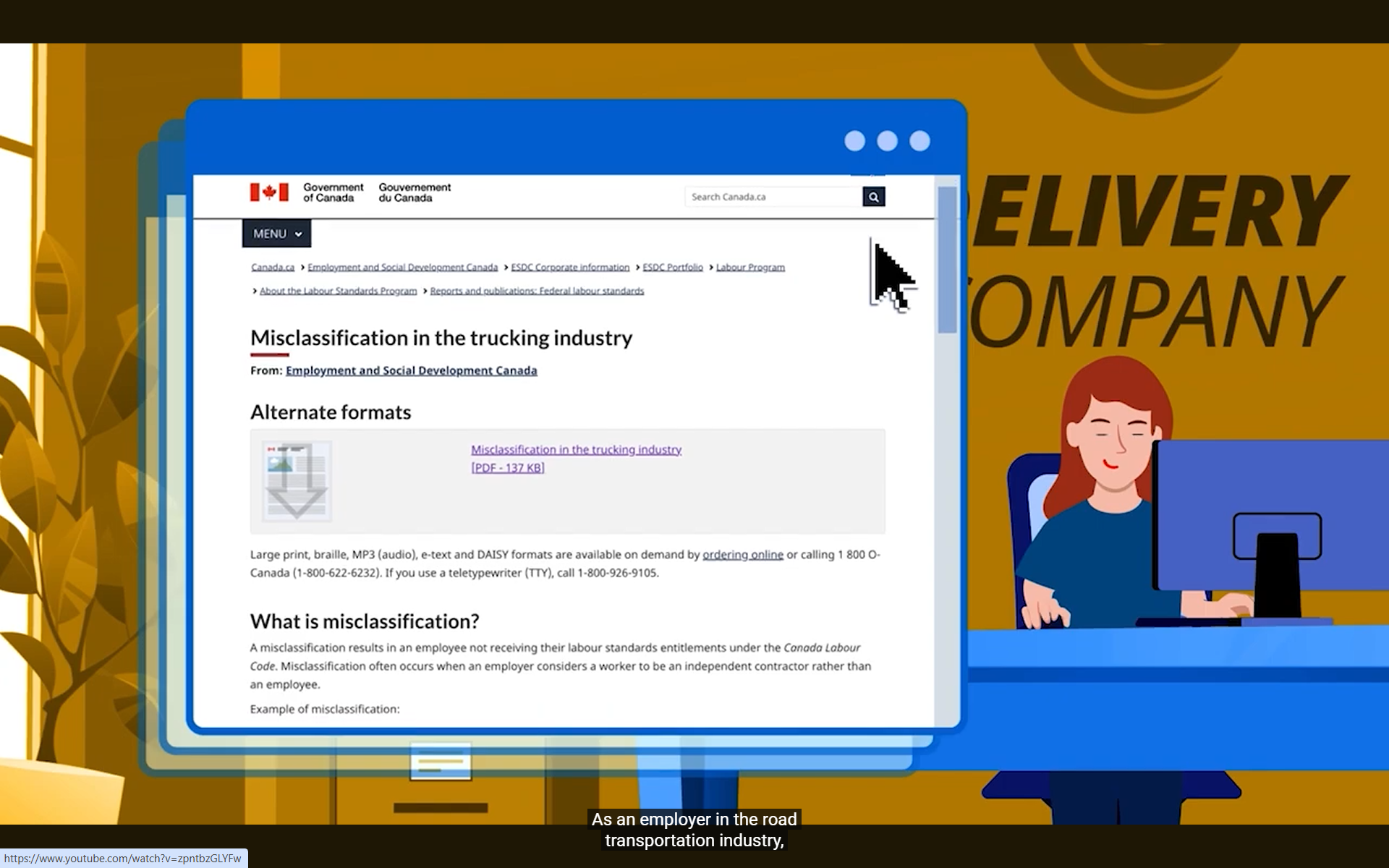Understanding Driver Misclassification in the Trucking Industry
Employment and Social Development Canada (ESDC) has issued a clear and serious notice to the Canadian trucking sector, emphasizing that misclassifying truck drivers under the so-called “Driver Inc.” model is illegal and will lead to penalties. This warning stems from concerns that some trucking companies treat drivers as independent contractors instead of employees, which can sidestep important labor protections and benefits.
What Exactly Is Misclassification?
Misclassification occurs when an employer designates a worker as an independent contractor rather than an employee, despite the actual nature of their work relationship. In trucking, this often means drivers are labeled as business owners operating their own enterprises (“Driver Inc.”), even though they perform their duties much like employees.
This classification allows companies to avoid paying overtime, vacation pay, employment insurance premiums, and Canada Pension Plan (CPP) contributions that would normally apply to employees. The ESDC’s campaign aims to shed light on these actions, reminding all parties of the legal expectations and consequences involved.
Employer Obligations and Penalties
ESDC’s labor programme has put together informative resources, including a video titled “Misclassification is illegal,” to clearly explain the obligations employers must follow under the Canada Labour Code. Employers are required to properly classify workers and respect associated labor standards, such as:
- Paying fair wages including overtime
- Providing vacation and statutory leave benefits
- Making contributions to employment insurance and the Canada Pension Plan
Penalties for ignoring these rules can range from fines to legal action, creating financial and reputational risks for violators. The ESDC is sharpening enforcement efforts to protect drivers’ rights and uphold fairness in the industry.
Widespread Non-Compliance Across Canada
According to the Canadian Trucking Alliance (CTA), non-compliance rates with labor laws in the trucking industry hover around 40% nationwide. The situation is even more pronounced in Ontario, where non-compliance reaches nearly 65%. These figures reveal a significant level of ongoing misclassification issues.
| Region | Non-Compliance Rate (%) |
|---|---|
| Canada (National Avg.) | 40 |
| Ontario | 65 |
Industry Reaction and Calls for Tougher Measures
Leaders within the trucking industry and labor advocates alike have urged the government to bolster enforcement actions and impose stiffer penalties on employers who misclassify drivers. The persistent misuse of the Driver Inc. model is seen as a form of abuse that undermines workers’ rights and fair market competition.
Jonathan Blackham, the director of policy and public affairs at the CTA, has voiced support for the ESDC’s crackdown and stressed the need for additional resources to empower enforcement officers. It’s a classic case of “the bad apples” spoiling the sector’s reputation, and tackling this headlong is key for sustainable trucking business practices.
Širší důsledky pro logistiku
This crackdown impacts logistics companies and freight operators by clarifying legal frameworks and encouraging compliance. Fair labor practices help create a stable, motivated driver workforce, reducing risks of workforce shortages or strikes, which could disrupt shipment schedules and freight delivery. Reliable classification also supports trust between carriers and customers by fostering ethical haulage and transportation standards.
Why Proper Classification Matters in Freight and Delivery
Proper employee classification affects not only internal operations but also the entire logistics chain — from dispatch and forwarding to the last-mile courier deliveries. Misclassification can jeopardize delivery reliability and inflate costs when legal disputes arise, causing headaches for supply chain managers and affecting customer satisfaction.
Looking Ahead: Opportunities for Better Compliance
Although the regulatory push may appear challenging for some operators, it’s a solid step toward transparency and fairness in the trucking industry. Employers who comply will likely benefit from better workforce stability and reduced legal risk in the long run.
Platforms like GetTransport.com, which offer accessible and affordable global cargo transportation solutions, can adapt more smoothly to evolving labor standards by structuring relationships fairly with drivers and service providers — whether for moving office equipment, shipping bulky freight, or organizing housemoves.
Experience Beats Reviews Every Time
It’s one thing to read about regulations and hear opinions, but nothing quite substitutes the firsthand experience of working with compliant, reputable carriers. On GetTransport.com, you can book cargo transportation worldwide at competitive prices with transparency — empowering you to make decisions that protect your freight and wallet.
The platform’s ease of use, extensive choice of carriers, and affordable rates combine to simplify logistics complexities and minimize surprises. Whether it’s a pallet shipment, international haulage, or moving bulky furniture, GetTransport.com offers reliability that takes the weight off your shoulders. Rezervujte si jízdu ještě dnes na adrese GetTransport.com for hassle-free transportation service.
Souhrn
Employment and Social Development Canada’s firm stance against the illegal misclassification of truck drivers draws attention to a widespread labor compliance issue in Canada’s trucking sector. By cracking down on the Driver Inc. model’s misuse, ESDC aims to ensure fair compensation, legal benefits, and protections for drivers while promoting ethical business practices across the freight and logistics industry.
The repercussions extend throughout the logistics chain, affecting shipment efficiency, haulage reliability, and overall supply chain health. Solutions like GetTransport.com, with its transparent and affordable approach, align perfectly with this environment—supporting robust, legal, and dependable transport and moving operations on a global scale.

 ESDC’s Strong Reminder: Misclassifying Truck Drivers as Independent Contractors Is Against Canadian Law">
ESDC’s Strong Reminder: Misclassifying Truck Drivers as Independent Contractors Is Against Canadian Law">